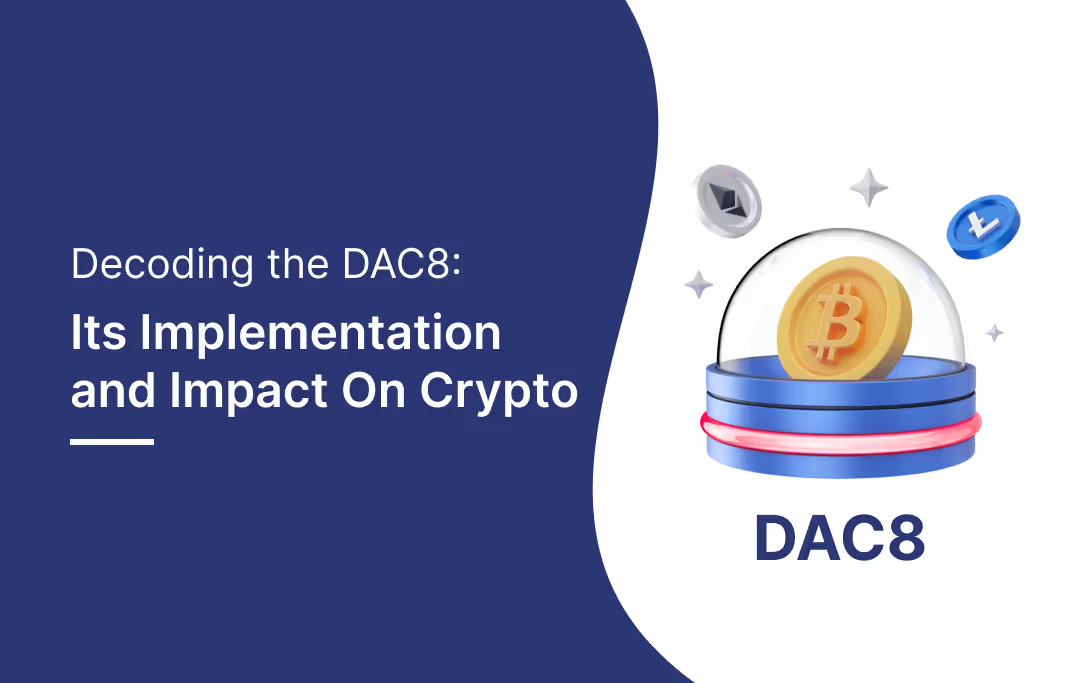.avif)
Calculate Your Crypto
Taxes in Minutes

On 8 December 2022, The European Commission proposed a regulatory framework – DAC8 – that would oblige the crypto service providers globally to report transactions of users in the EU.
The DAC-8 is the eighth amendment to the Directive on Administrative Cooperation, the primary framework for data exchanges between tax authorities which dates back to 2011 and was limited to only EU-based organizations. With this revised framework, the EU has taken a step towards improved crypto taxation complementing legislation like MiCA.
Defining The Scope Of DAC8
DAC8 regulates crypto businesses providing their services to EU residents regardless of their location, meaning its scope is global. It covers cryptocurrency tax guidelines for both crypto-asset service providers regulated under MiCA and those that are not.
While MiCA provides the conditions for access to crypto service providers in the EU market, it does not provide a basis for tax authorities to collect and exchange the information that they need for crypto tax purposes.
This is where DAC8 will be applicable – containing provisions on exchange and tax reporting of crypto assets. DAC8 is aligned with the definitions laid out in MiCA, so crypto service providers do not need to worry about additional administrative burdens.
DAC8 is proposed to counter tax fraud and evasion through the following regulations:
- Crypto-asset service providers have to report transactions of clients residing in the EU, irrespective of their size or location. This also includes cross-border transactions and in some cases, covers NFTs.
- Financial institutions have to report on e-money and central bank digital currencies.
- The DAC8 framework extends the scope of the automatic exchange of advance cross-border rulings for high net-worth individuals.
- It sets a minimum level of penalties for taxpayers with serious non-compliance. The actual fine depends on the seriousness of the violation and also on the EU member state.
What Does DAC8 Mean For Cryptocurrency Taxes?
The cryptocurrency market is still evolving and lacked any specific legislation by the state until now. But with the EU’s proposed frameworks including the DAC8 and MiCA, cryptocurrency is set to be adopted and used widely as a trusted form of investment.
This also means there will be a single set of laws for cryptocurrencies all across the EU. This will remove ambiguities around crypto taxation and help investors align their investments with crypto tax compliance.
It will also ensure there are no tax evasions and tax fraudulence for crypto assets, bringing more transparency and an additional revenue of approximately €2.4 billion for EU member states.

Digital Asset Taxation Compliance For High-net-worth Individuals
As per DAC8, the exchange of crypto-asset-related information is to be extended to cross-border advance rulings of high-net-worth individuals. In this case, an automatic exchange of information will take place with the EU member states.
As per the EU Commission,
“The persons concerned are those who hold a minimum of €1.000.000 in financial or investable wealth, or in assets under management. These exclude the individual's main private residence. Member States will exchange information on the advance cross-border rulings issued, amended or renewed between 1 January 2020 and 31 December 2026.”
What Will The Future Hold?
In the future, all crypto service providers providing crypto transactional services to EU residents will have to share their transaction data with the EU authorities. This is irrespective of whether or not they are operating in the EU or fall under MiCA.
While this means crypto transactions may lose their “anonymity” factor, the good news is it will help boost the adoption of crypto in more mainstream utilities, for instance, e-commerce.
It will also safeguard consumers using crypto for purchases in terms of refunds or any fraudulence and improve digital taxation compliance.
FAQs
1. What is DAC 8?
The DAC-8 is the eighth amendment to the Directive on Administrative Cooperation that has been proposed by the EU authorities to simplify crypto taxation. As per this framework, crypto service providers have to report the transactions of their EU clients irrespective of their business location.
2. What is the DAC regulation?
The DAC, or Directive on Administrative Cooperation is the main framework for data exchanges between tax authorities which dates back to 2011 and is limited to EU-based businesses.
3. What is the limit of DAC?
The DAC regulatory framework is limited to data exchanges between tax authorities for organizations located within the EU region.
4. What does DAC stand for?
DAC is also called the Directive on Administration Cooperation – the main framework that exists since 2011 for data exchanges between tax authorities.
5. Why is DAC needed?
The DAC acts as a regulatory framework defining a uniform set of laws for taxation in the EU region. This prevents tax evasion, tax fraudulence, and ensures there is complete legal compliance across all member states.
All content on Kryptos serves general informational purposes only. It's not intended to replace any professional advice from licensed accountants, attorneys, or certified financial and tax professionals. The information is completed to the best of our knowledge and we at Kryptos do not claim either correctness or accuracy of the same. Before taking any tax position / stance, you should always consider seeking independent legal, financial, taxation or other advice from the professionals. Kryptos is not liable for any loss caused from the use of, or by placing reliance on, the information on this website. Kryptos disclaims any responsibility for the accuracy or adequacy of any positions taken by you in your tax returns. Thank you for being part of our community, and we're excited to continue guiding you on your crypto journey!
| Step | Form | Purpose | Action |
|---|---|---|---|
| 1 | 1099-DA | Reports digital asset sales or exchanges | Use to fill out Form 8949. |
| 2 | Form 1099-MISC | Reports miscellaneous crypto income | Use to fill out Schedule 1 or C. |
| 3 | Form 8949 | Details individual transactions | List each transaction here. |
| 4 | Schedule D | Summarizes capital gains/losses | Transfer totals from Form 8949. |
| 5 | Schedule 1 | Reports miscellaneous income | Include miscellaneous income (if not self-employment). |
| 6 | Schedule C | Reports self-employment income | Include self-employment income and expenses. |
| 7 | Form W-2 | Reports wages (if paid in Bitcoin) | Include wages in total income. |
| 8 | Form 1040 | Primary tax return | Summarize all income, deductions, and tax owed. |
| Date | Event/Requirement |
|---|---|
| January 1, 2025 | Brokers begin tracking and reporting digital asset transactions. |
| February 2026 | Brokers issue Form 1099-DA for the 2025 tax year to taxpayers. |
| April 15, 2026 | Deadline for taxpayers to file their 2025 tax returns with IRS data. |
| Timeline Event | Description |
|---|---|
| Before January 1, 2025 | Taxpayers must identify wallets and accounts containing digital assets and document unused basis. |
| January 1, 2025 | Snapshot date for confirming remaining digital assets in wallets and accounts. |
| March 2025 | Brokers begin issuing Form 1099-DA, reflecting a wallet-specific basis. |
| Before Filing 2025 Tax Returns | Taxpayers must finalize their Safe Harbor Allocation to ensure compliance and avoid penalties. |
| Feature | Use Case Scenario | Technical Details |
|---|---|---|
| Automated Monitoring of Transactions | Alice uses staking on Ethereum 2.0 and yield farming on Uniswap. Kryptos automates tracking of her staking rewards and LP tokens across platforms. | Integrates with Ethereum and Uniswap APIs for real-time tracking and monitoring of transactions. |
| Comprehensive Data Collection | Bob switches between liquidity pools and staking protocols. Kryptos aggregates all transactions, including historical data. | Pulls and consolidates data from multiple sources and supports historical data imports. |
| Advanced Tax Categorization | Carol earns from staking Polkadot and yield farming on Aave. Kryptos categorizes her rewards as ordinary income and investment income. | Uses jurisdiction-specific rules to categorize rewards and guarantee compliance with local tax regulations. |
| Dynamic FMV Calculation | Dave redeems LP tokens for Ethereum and stablecoins. Kryptos calculates the fair market value (FMV) at redemption and during sales. | Updates FMV based on market data and accurately calculates capital gains for transactions. |
| Handling Complex DeFi Transactions | Eve engages in multi-step DeFi transactions. Kryptos tracks value changes and tax implications throughout these processes. | Manages multi-step transactions, including swaps and staking, for comprehensive tax reporting. |
| Real-Time Alerts and Updates | Frank receives alerts on contemporary tax regulations affecting DeFi. Kryptos keeps him updated on relevant changes in tax laws. | Observe regulatory updates and provide real-time alerts about changes in tax regulations. |
| Seamless Tax Reporting Integration | Grace files taxes using TurboTax. Kryptos integrates with TurboTax to import staking and yield farming data easily. | Direct integration with tax software like TurboTax for smooth data import and multi-jurisdictional reporting. |
| Investor Type | Impact of Crypto Tax Updates 2025 |
|---|---|
| Retail Investors | Standardized crypto reporting regulations make tax filing easier, but increased IRS visibility raises the risk of audits. |
| Traders & HFT Users | To ensure crypto tax compliance, the IRS is increasing its scrutiny and requiring precise cost-basis calculations across several exchanges. |
| Defi & Staking Participants | The regulations for reporting crypto transactions for staking rewards, lending, and governance tokens are unclear, and there is a lack of standardization for decentralized platforms. |
| NFT Creators & Buyers | Confusion over crypto capital gains tax in 2025, including the taxation of NFT flips, royalties, and transactions across several blockchains. |
| Crypto Payments & Businesses | Merchants who take Bitcoin, USDC, and other digital assets must track crypto capital gains for each transaction, which increases crypto tax compliance requirements. |
| Event | Consequences | Penalties |
|---|---|---|
| Reporting Failure | The tax authorities can mark uncontrolled revenues and further investigate. | Penalty fines, interest on unpaid taxes and potential fraud fees if they are deliberately occurring. |
| Misreporting CGT | Misreporting CGT Error reporting profits or losses can trigger the IRS audit. | 20% fine on under -ported zodiac signs, as well as tax and interest. |
| Using decentralized exchanges (DEXs) or mixers without records | The IRS can track anonymous transactions and demand documentation. | Possible tax evasion fee and significant fine. |
| Disregarding Bitcoin mining tax liabilities | Mining reward is considered taxable income, and failure of the report can be regarded as tax fraud. | Further tax obligations, punishment and potential legal steps. |
| Foreign crypto holdings: Non-disclosure | Foreign-accepted crypto FATCA may be subject to reporting rules. | Heavy fines (up to $ 10,000 per fracture) or prosecution for intentional non-transport. |
File Your Crypto Tax in Minutes








